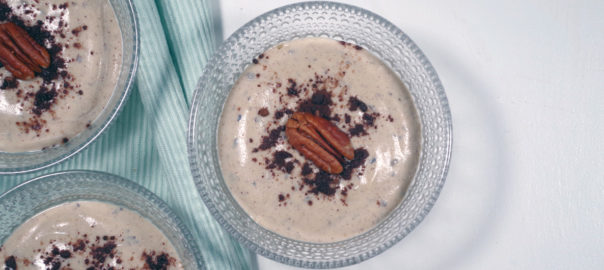Yoga Kitchen – Simple, healthy, plant-based and compassionate.
Silken tofu as a basis for vegetable desserts.
When you eat healthy and plant-based, you leave out animal dairy products.
Sometimes that can seem like a daunting task.
That’s why it’s good to guard against the temptation of the gigantic and excessively large dairy departments in supermarkets, with all their overpackaged sweet cream and milk desserts.
Sadly, there is still relatively little plant-based dairy products and desserts in the trade. In the strategy to protect yourself, it is a good idea to make superior home-made versions yourself that you just have ready in your fridge. Things that are just as tasty and a lot healthier and which you can enjoy every day in moderation. By making them yourself, you know exactly what goes into them and you also save money and a huge mountain of packaging waste.
Here is an example of a very flexible basic recipe that you can vary in different flavour versions.
What do you need?
The basics
For the sweet silk tofu base you only need 2 to 3 ingredients:
- 400 gr silken tofu
- 6 to 7 large soft organic medjool or mazafati dates
And then there are the following options:
- If you are an intensive athlete or if you want your dessert to be a bit more solid, then you may want to add 20 grams of pea protein.
- If you just want it to be a bit firmer, without an extra protein boost, simply add a teaspoon of psyllium fibre.
The tastes
As for flavour, here are four different versions, each with its own flavour. But actually, there is no need to put a brake on your creativity.
For a chocolate version:
- 2 tablespoons (raw) unsweetened cocoa
For a speculaas/allspice version:
- 1 to 2 teaspoons of speculaas spices (or allspice mixture)
- 1 extra teaspoon of cinnamon
For a hazelnut version (my favourite!):
- 3 tablespoons organic unsweetened whole hazelnut butter
For a fruity version:
- 30 g fruit such as mango (fresh or rehydrated dried mango) or fresh red fruit
- some extra fruit to decorate
The toppings
To finish off, you can decorate the desserts with all kinds of tasty and healthy things such as:
- walnuts or pecans
- coarsely chopped raw cocoa beans
- cinnamon powder
- Some extra cocoa powder
- Grated coconut
- Extra fruit
Procedure:
This is really super easy.
- Remove the seeds from the dates and cut them into pieces.
- Do the silken tofu, dates, flavoring ingredients and possibly the pea protein in a food processor. Then grind everything until you have an even, fairly firm creamy texture.
- Divide the result over 4 bowls.
- Decorate with the elements of your choice.
- Put in the refrigerator for a few hours to become firmer.
Bon appetit!
This dessert has deliberately been kept moderately sweet. We eat too much sugar anyway.
Do you find it not sweet enough? Then add 2 more dates, or a tablespoon of agave or maple syrup.
How is silken tofu made?
Silken tofu, like the firmer tofu, is made from soya beans. Its texture is a bit like a firm cottage cheese. Silken tofu is usually sold in 400 gram cartons.
Silken tofu consists of a large proportion of water and soya beans (approx. 20% – can vary somewhat from manufacturer to manufacturer) and contains around 5.3 g of high-quality protein per 100 g of product.
It also contains fat and carbohydrates in roughly equal proportions (approx. 2 g each). Silken tofu contains virtually neither sugars, nor salt.
It is very suitable for making desserts with a creamy texture.
Is silken tofu a good source of calcium?
.
Tofu can also be quite rich in calcium. It can … but not necessarily. It all depends on how the soya proteins are curdled. In order to curdle the proteins, a simple salt is used, which does not affect the taste. This salt is sold under the name of Nigari. It consists of:
- either calcium chloride
- or magnesium chloride
In the first case the end product (the silken tofu) will be rich in calcium, in the other case rich in magnesium.
Silken tofu / Nutritional value per 100 g product:
| Energy | Carbs | Sugars | Fat | Sat. Fat | Protein | Fibre | Salt |
|---|---|---|---|---|---|---|---|
| 202 kJ/48 kcal | 1.8 g | <0.5 g | 2.1 g | 0.5 g | 5.3 g | – | <0,01 g |
Read more about plant-based nutrition and health:
Read more articles about nutrition, health and plant-based foods:
Read more about plant-based food
Read more about yoga and yoga classes in Schaerbeek:
Check out our yoga classes here:

